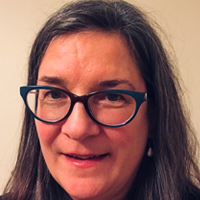
- This event has passed.
VEEPs 2020: Kamala Harris vs. Mike Pence
October 19, 2020 @ 12:00 am

Due to the COVID-19 Pandemic, this fall’s public programs will be reimagined as a special series of the Communication Matters podcast as well as a series of videos. The pubilc program series, entitled “Communicating During a Presidential Election Year” will include three public programs: “The Politics of Health and Healthcare: Communicating about Health in Presidential Election Year,” “Communicating about the Role of Race and Social Change in Politics,” and “VEEPS 2020: Kamala Harris vs. Mike Pence.” Please visit the NCA Podcast page and NCA’s YouTube channel for these programs that will be recorded and published in podcast and video format.
![]()
Moderator

Trevor Parry-Giles, Executive Director, National Communication Association
Trevor Parry-Giles graduated from Ripon College and holds an M.A. from the University of New Mexico and a Ph.D. from Indiana University. In addition to his NCA position, he is a professor in the Department of Communication at the University of Maryland where he is also an affiliate faculty member with the Department of African American Studies and the Graduate School Field Committee in Film Studies. Dr. Parry-Giles’s research and teaching focus on the historical and contemporary relationships between rhetoric, politics, law, and popular culture. He is the award-winning author or editor of four books and his research has appeared in the Quarterly Journal of Speech, Rhetoric & Public Affairs, Presidential Studies Quarterly, Critical Studies in Mass Communication, the Journal of Communication, and elsewhere. Dr. Parry-Giles is a Distinguished Research Fellow and a Distinguished Teaching Fellow of the Eastern Communication Association. In 2019, Parry-Giles received the University of Maryland’s Graduate Faculty Mentor of the Year Award.
Panelists

Karrin Vasby Anderson, PhD, Professor of Communication Studies, Colorado State University
Karrin Vasby Anderson is Professor of Communication Studies at Colorado State University, where she serves as Director of Graduate Studies and teaches courses in rhetoric, political communication, and gender and communication. She is the current editor of NCA’s Quarterly Journal of Speech. Dr. Anderson’s books include Woman President: Confronting Postfeminist Political Culture; Women, Feminism, and Pop Politics: From “Bitch” to “Badass” and Beyond; and Governing Codes: Gender, Metaphor, and Political Identity. She is a recipient of the National Communication Association’s James A. Winans–Herbert A. Wichelns Memorial Award for Distinguished Scholarship in Rhetoric and Public Address.

Darrian Carroll, Doctoral Student, Department of Communication, University of Maryland, College Park
Darrian Carroll is a third-year doctoral student at the University of Maryland, College Park. Darrian is interested in race, rhetoric, and world making. Carroll has written about Bill Clinton’s advocacy in favor of the 1994 Crime Bill. Currently, he is working on a longer-term project that focuses on the rhetoric of Marcus Garvey and the Universal Negro Improvement Association.

Sumana Chattopadhyay, Associate Professor, Marquette University
Sumana Chattopadhyay is Associate Professor in the Diederich College of Communication at Marquette University. Her research interests focus on political advertising, public opinion, media use and political participation and cross-cultural media coverage of crises. She published work focusing on the 2004, 2008 and 2016 U.S. presidential campaigns. Dr. Chattopadhyay is the Chair of the National Communication Association’s Political Communication Division and Vice Chair of the Media and Diaspora working group of the International Association for Media and Communication Research.

Kimberley Hannah-Prater, Assistant Professor of Communication Arts, Community College of Baltimore County (Maryland)
Kim Hannah-Prater is Assistant Professor of Communication Arts at the Community College of Baltimore County (Maryland). She researches media representations of gender in politics and pop culture. Hannah-Prater has studied the ways in which Hillary Rodham Clinton has been depicted over the years in mediated political satire, parody, and Internet humor. Hannah-Prater’s other research interests include masculinity in film and theater, African American comedians’ use of code-switching, and news coverage of contemporary social movements.

Shawn J. Parry-Giles, PhD, Professor of Communication, University of Maryland, College Park & Director of the Rosenker Center for Political Communication & Civic Leadership
Shawn J. Parry-Giles is Professor of Communication at the University of Maryland, College Park. She is also the Director of the Rosenker Center for Political Communication & Civic Leadership at UMD. Dr. Parry-Giles studies rhetoric and politics with a focus on the presidency and the first lady. She is the author, co-author, or co-editor of seven books. She also is co-editor of the NEH-funded Voices of Democracy: The U.S. Oratory Project and Recovering Democracy Archives: Speech Recovery Project. Dr. Parry-Giles has published in such journals of Quarterly Journal of Speech, Rhetoric & Public Affairs, and Presidential Studies Quarterly.

Kristina Horn Sheeler, PhD, Professor, Communication Studies, Indiana University – Purdue University Indianapolis
Kristina Horn Sheeler is Professor of Communication Studies and the Executive Associate Dean of the Honors College at Indiana University-Purdue University Indianapolis. Her research is in the area of gender and political communication, studying the ways that political candidate identity is contested and constructed in popular media, political discourse, journalism, and punditry. Her book, Woman President: Confronting Postfeminist Political Culture (2013), co-authored with Karrin Vasby Anderson, won the Organization for the Study of Communication, Language, and Gender’s Outstanding Book Award in 2014 and the National Communication Association’s 2014 James A. Winans–Herbert A. Wichelns Memorial Award for Distinguished Scholarship in Rhetoric and Public Address.

Mary Douglas Vavrus, Professor of Communication Studies, University of Minnesota
Mary Douglas Vavrus is Professor in the Department of Communication Studies at the University of Minnesota. Her teaching and research is mainly in the areas of feminist media studies and political communication. Dr. Vavrus has published research that examines news media representations of women in electoral politics, media constructions of masculinity, the political stakes associated with media constructions of branded voting blocs such as Soccer Moms and NASCAR Dads, and media representations of women in the context of war and the military. Her most recent book is Postfeminist War: Women and the Media-Military-Industrial Complex.

Tammy R. Vigil, Ph.D., Associate Professor of Communication, Boston University
Tammy R. Vigil is Associate Professor of Communication at Boston University. She earned her doctorate from the University of Kansas. Her research focuses on political campaigns, persuasion, and women in politics. Dr. Vigil’s books include Moms in Chief: The Rhetoric of Republican Motherhood and the Spouses of Presidential Nominees, 1992-2016 (University Press of Kansas, 2019), Melania & Michelle: First Ladies in a New Era, and Connecting with Constituents: Identification Building and Blocking in Contemporary National Convention Addresses. She also co-authored The Third Agenda in U.S. Presidential Debates: Debate Watch and Citizen Reactions, 1996-2004.
![]()
A Public Program of the National Communication Association.
Co-Sponsored by the Mark and Heather Rosenker Center for Political Communication and Civic Leadership at the University of Maryland and the Communication Research Center at Boston University.
Co-Sponsors

.well3{ background-color: #faf6f3; padding-left: 20px; padding-right: 20px; padding-top: 20px; padding-bottom: 20px;border-left: 0px; border-right: 0px; border-bottom: 0px; border-top: 2px; border-style: solid;
border-color: #f5a623; }
}
.well9{ background-color: #ffffff; padding-left: 15px; padding-right: 20px; padding-top: 5px; padding-bottom: 5px;border-left: 7px; border-right: 0px; border-bottom: 0px; border-top: 0px; border-style: solid; border-color: #666666;}
}
.well8{ background-color: #ffffff; padding-left: 20px; padding-right: 20px; padding-top: 10px; padding-bottom: 10px;border-left: 0px; border-right: 0px; border-bottom: 0px; border-top: 0px; border-style: solid; border-color: #a6ce39;}
}
.thumbnail { box-shadow: 0 4px 8px 0 rgba(0, 0, 0, 0.2), 0 6px 20px 0 rgba(0, 0, 0, 0.19); }
.well2{ background-color: #1D306A; padding-left: 20px; padding-right: 20px; padding-top: 20px; padding-bottom: 20px;border-left: 0px; border-right: 0px; border-bottom: 0px; border-top: 0px; border-style: solid;
border-color: #1D306A; box-shadow: 0 4px 8px 0 rgba(0, 0, 0, 0.2), 0 6px 20px 0 rgba(0, 0, 0, 0.19); }
}
.well1{ background-color: #DB2727; padding-left: 20px; padding-right: 20px; padding-top: 20px; padding-bottom: 20px;border-left: 0px; border-right: 0px; border-bottom: 0px; border-top: 0px; border-style: solid;
border-color: #DB2727; box-shadow: 0 4px 8px 0 rgba(0, 0, 0, 0.2), 0 6px 20px 0 rgba(0, 0, 0, 0.19); }
}